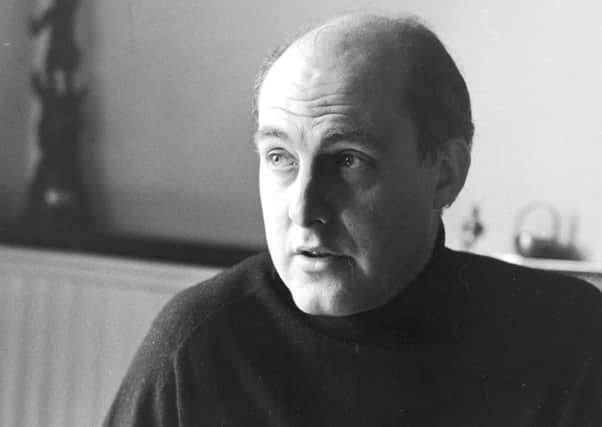Obituary: Gordon Honeycombe, playwright and novelist


Born: 27 September, 1936, in Karachi.
In 1965 Gordon Honeycombe was a member of the groundbreaking team of newscasters who revolutionised the television news. ITN injected some spice into the 10 O’clock news with personalities such as Alistair Burnett, Reginald Bosanquet, Robin Day and Honeycombe. Honeycombe was tall, bald and distinguished with a fine speaking voice – preserving a hint of his Scottish background. From 1965–77 he was an integral member of ITN and returned to television in the 1980s to front TV-am’s bulletins for five years before relocating in Australia. He was also a well-known writer of novels and stage plays.
Honeycombe’s departure from ITN in 1977 hit the headlines as he was keen to branch out from being a newscaster and also began writing for newspapers. He wrote a controversial piece for the Daily Mail supporting the strike by firemen – Red Watch – and was immediately summoned to the offices of ITN and suspended. Honeycombe resigned on the spot.
Advertisement
Hide AdAdvertisement
Hide AdRonald Gordon Honeycombe was the son of Scottish parents and his father worked for an American oil company in Pakistan. He attended the Edinburgh Academy where he showed a burgeoning talent as an actor.
At 13 he was an impressive Goneril in King Lear and played the father in The Princess and the Swineherd, during which he had to kiss the Princess 21 times. Honeycombe also appeared in Julius Caesar (a noted Brutus) but it was Gilbert and Sullivan that contemporaries recall with a special pleasure. The school chronicle recorded Honeycombe’s commanding performance in the title role: “The Mikado himself, whose majestic figure towered over all others. Here was the most accomplished actor and singer of all this gifted company.” Honeycombe also sang an imposing Private Willis in Iolanthe.
He then read English at University College, Oxford and came to the Edinburgh Festival Fringe for two years in The Miracles and Songs for an Autumn Rifle. The Miracles was later performed by the Royal Shakespeare Company (RSC) on a tour. Honeycombe also spent one summer holiday as a trainee radio announcer with the BBC in Glasgow.
He did his national service with the Royal Artillery in Hong Kong, where he gained further experience as a broadcaster with Radio Hong Kong.
Initially he pursued a career in acting and joined a touring company, managed by his friend Richard Ingrams, that visited schools. In 1962 he joined the RSC but meaty parts were not easy to come by and in 1965 he joined ITN as a script-writer and newsreader. At the audition he recalled: “I read two minutes’ worth of headlines as a test. Two weeks later, I was reading the news, earning £25 a week.”
Honeycombe was never a flamboyant newsreader. In front of the cameras he was smart, well-dressed and efficient – articulated clearly and was meticulous about pronunciation of foreign names. He had a good microphone technique and never resorted to quips or sign-off jokes. He was often seen on the early evening and week-end bulletins and was twice voted the most popular newscaster.
Things didn’t always go according to plan. Once he read the autocue incorrectly and said: “Princess Charles and Prince Anne”. He recalled: “I turned bright red and tried to correct myself but made matters even worse.”
Honeycombe concentrated on his writing and in 1968 had a television play about obsessive Everton supporters, The Golden Vision (directed by Ken Loach), shown on the prestigious Wednesday Play slot.
Advertisement
Hide AdAdvertisement
Hide AdHe had plays produced at Chichester and the Old Vic in London. Honeycombe had been fascinated by criminal history and The Murders of the Black Museum was a best seller. For STV he presented Something Special.
In 1984 Honeycombe joined the new breakfast television station TV-am as a newscaster and stayed for five years – “Rising at 4.30 every morning and presenting seven bulletins rather lost its attraction after a time,” he admitted. He returned to the stage and did panto with Cilla Black and a tour of Run for Your Wife with Les Dawson.
The stage was a great passion but Honeycombe was fascinated with writing. He was a fine wordsmith and historian and an early success was his novel Neither the Sea Nor the Sand, much of which was set in the north-east of Scotland. His 1974 book, Adam’s Tale, was a factual account of the drug squad at New Scotland Yard and was well received by the critics. Honeycombe also wrote the history of Selfridges to celebrate its 75th year in 1984.
In 1993 Honeycombe, who never married, became an Australian citizen. He continued to direct plays in Perth and relived his youth when he performed Pooh-Bah in The Mikado. “I’ve become seduced by the Australian philosophy that ‘tomorrow’s another day’,” he said, “and I lead a relaxed life which couldn’t be better.”
ALASDAIR STEVEN